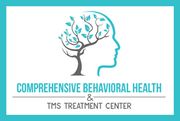Is Your Loved One Suffering? 5 Symptoms of a Mental Health Disorder

If you suspect your loved one is suffering from a mental health disorder, it is natural to want to do all you can to help them. However, some people are afraid to offend their spouse, parent, or child, especially if they aren’t sure if they are dealing with a diagnosable illness. Comprehensive Behavioral Health in Fishersville, VA, wants families to know there is assistance available in the community to help men and women manage their depression, bipolar, or anxiety disorder. Take the first step in supporting them by recognizing the signs of a problem.
Mood Changes
 If your loved one is exhibiting rapid shifts in mood or intense anger, it may be a mental health condition. Extreme sadness or irritability can signal depression, while despair that quickly changes to euphoria could be a symptom of bipolar disorder.
If your loved one is exhibiting rapid shifts in mood or intense anger, it may be a mental health condition. Extreme sadness or irritability can signal depression, while despair that quickly changes to euphoria could be a symptom of bipolar disorder.
Isolation
A sudden withdrawal from activities once enjoyed is another potential sign of a mental health problem. People who isolate may be having an “off” week, or it may be another issue entirely. If you see a loved one avoiding activities they once looked forward to, consider talking to them to see how they are feeling.
Sleep Problems
Mental illness can also cause significant sleep problems. Depression may cause people to spend too much time in bed, while those with other conditions may not be able to sleep because of intrusive thoughts or nervousness. If you notice a dramatic change in your loved one’s sleep patterns, ask them to consider a trip to the doctor. While emotional challenges may be the cause, it is also possible they are suffering from physical problems that may be taking a toll.
Work & School Challenges
A star student who begins to receive D’s and F’s in school may be struggling with anxiety or depression. Enthusiastic employees who suddenly have trouble controlling their anger around their boss or co-workers may be challenged by strong emotions as well. Look for changes in energy, desire, or mood, especially as they relate to academic and professional life.
Nervousness
Nervousness and apprehension are often attributed to an anxiety disorder. Your loved one may not be able to control their worry or may start avoiding social situations. If you have a family member who seems paralyzed by fear or can’t manage their thoughts, it may be time to consult a professional.
No matter what type of mental illness your loved one is dealing with, there is help available. What’s more, those who receive treatment for depression, anxiety, and bipolar disorder can live happy, productive lives. For mental health assistance for yourself or a loved one, call Comprehensive Behavioral Health in Fishersville, VA, at (540) 688-2646. To learn more about their psychiatric services and health professionals, visit their website.
About the Business
Have a question? Ask the experts!
Send your question

